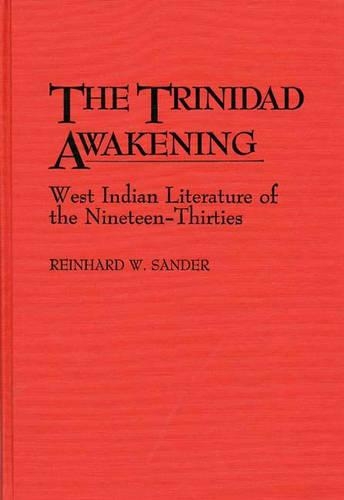
The Trinidad Awakening: West Indian Literature of the Nineteen-Thirties
(Hardback)
Publishing Details
The Trinidad Awakening: West Indian Literature of the Nineteen-Thirties
By (Author) Reinhard Sander
Bloomsbury Publishing PLC
Praeger Publishers Inc
12th August 1988
United States
Classifications
Tertiary Education
Non Fiction
810.9
Physical Properties
Hardback
180
Description
Sander . . . presents a definitive, thoroughly researched, gracefully expressed study of literary activity in Trinidad in the 1930s, and its literary/cultural implications for West Indian literature in general. . . . In Caribbean literary studies, Sander's work is pioneering in its drawing of successful links between cultural productions and historical realities. The book's organization is clear and logical; its accessibility enhanced by a well-documented index. Choice This is the first comprehensive history of the Trinidadian literature that paved the way for the emergence over the past forty years of many major West Indian literary works. Sander contends that the sporadic nature of literary output in the island before the late 1920s can be explained in part as the consequence of Trinidad's linguistic diversity and its rapidly changing patterns of settlement. Until 1797 Trinidad had been a Spanish colony, with a large proportion of French-speaking inhabitants, and it was not until the end of the nineteenth century that English became more widely spoken. The burst of creative activity in the late 1920s was related to the new ascendancy of English and the fact that the society had begun to resolve itself into well-defined racial, social, and economic groupings.
Reviews
Sander (Hampshire College) author of From Trinidad (1978), presents a definitive, thoroughly researched, gracefully expressed study of literary activity in Trinidad in the 1930s, and its literary/cultural implications for West Indian literature in general. . . . In Caribbean literary studies, Sander's work is pioneering in its drawing of successful links between cultural productions and historical realities. The book's organization is clear and logical; its accessibility enhanced by a well-documented index. It also contains a useful bibliography divided into primary, general, and background sources. Given Sander's historical approach, particularly the impact of British colonialism, this book will also be valuable to scholars of postcoloninal Asian and African literatures. College and university libraries.-Choice
The study contains a useful, three-part bibliography with primary, general, and background sources and criticism. Compiling reliable bibliographic sources in Caribbean studies is a task not to be underrated. The region does not generously yield of its primary sources, nor is it easy to trace and credit copyright owners. This truism accentuates the real contribution any thoroughly researched, smartly written study makes to Caribbean scholarship; the literary scholar must be historian as well as sociologist.-Modern Fiction Studies
This is the first comprehensive history of the Trinidadian literature that paved the way for the emergence over the past forty years of many major West Indian literary works. . . . Highly recommended for all academic libraries.-A.L.B.R.
"The study contains a useful, three-part bibliography with primary, general, and background sources and criticism. Compiling reliable bibliographic sources in Caribbean studies is a task not to be underrated. The region does not generously yield of its primary sources, nor is it easy to trace and credit copyright owners. This truism accentuates the real contribution any thoroughly researched, smartly written study makes to Caribbean scholarship; the literary scholar must be historian as well as sociologist."-Modern Fiction Studies
"This is the first comprehensive history of the Trinidadian literature that paved the way for the emergence over the past forty years of many major West Indian literary works. . . . Highly recommended for all academic libraries."-A.L.B.R.
"Sander (Hampshire College) author of From Trinidad (1978), presents a definitive, thoroughly researched, gracefully expressed study of literary activity in Trinidad in the 1930s, and its literary/cultural implications for West Indian literature in general. . . . In Caribbean literary studies, Sander's work is pioneering in its drawing of successful links between cultural productions and historical realities. The book's organization is clear and logical; its accessibility enhanced by a well-documented index. It also contains a useful bibliography divided into primary, general, and background sources. Given Sander's historical approach, particularly the impact of British colonialism, this book will also be valuable to scholars of postcoloninal Asian and African literatures. College and university libraries."-Choice
Author Bio
REINHARD W. SANDER is Associate Professor of Comparative Literature at Hampshire College and the Five College Consortium in Amherst, Massachusetts.
